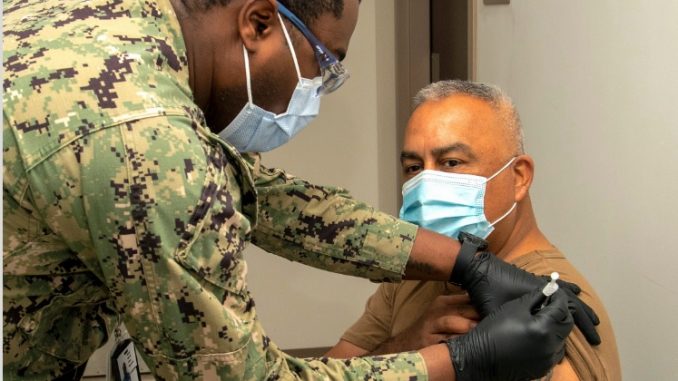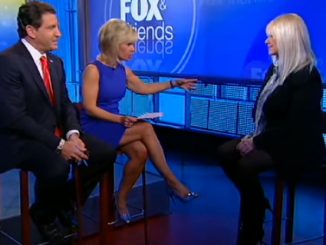
Navy Vaccine Religious Exemption Ruling Warrants Scrutiny
Law360 (January 5, 2022, 4:33 PM EST) —
George Chuzi
Beginning in the summer of 2021, the federal government has engaged in several efforts to have all Americans vaccinated against COVID-19.
In July of last year, the U.S. Department of Veterans Affairs required all healthcare providers and personnel to be vaccinated.[1]
On July 29, 2021, President Joe Biden announced that every federal employee and on-site contractor would be required to attest to their vaccination status.[2] Anyone who did not get vaccinated or declined the attestation requirement would be compelled to be masked at work and be tested once or twice a week.
In August, the U.S. Department of Defense issued a mandate requiring all DOD service members to be vaccinated against COVID-19.[3]
On Sept. 9, 2021, the president issued the “Path Out of the Pandemic” plan, which required all executive branch employees to be vaccinated, without a testing option.[4]
On Nov. 4, the U.S. Department of Health and Human Services‘ Centers for Medicare & Medicaid Services issued a rule requiring that all healthcare workers be vaccinated,[5] and the next day, the U.S. Department of Labor’s Occupational Safety and Health Administration issued a rule mandating that all companies with 100 or more employees require workers to be vaccinated or get tested on a weekly basis.[6]
All of these vaccine requirements were narrowly limited by exceptions for medical or religious reasons. Employees who could demonstrate that they were medically unable to be vaccinated with the COVID-19 vaccine, or that their sincerely held religious beliefs precluded vaccination, could theoretically be excused from the requirements.
While the U.S. Supreme Court has agreed to hear two challenges to the mandates on an expedited basis — a business and state challenge to the U.S. Court of Appeals for the Sixth Circuit’s approval of the OSHA mandate in National Federation of Independent Business v. DOL,[7] and the administration’s challenge to two district court decisions enjoining the HHS health care worker mandate in Biden v. Missouri[8] — challenges to the denial of religious exemptions have been far less successful.
In fact, no case challenging state or local application of the religious exemption has been successful, and the Supreme Court repeatedly has declined to hear challenges to local vaccine requirements that both include and omit a religious exemption.[9] That approach to the religious exemption may be over.
On Jan. 3, in U.S. Navy Seals 1-26 v. Biden, the U.S. District Court for the Northern District of Texas issued an order enjoining the Navy from disciplining 35 Navy SEALs who refused the COVID-19 vaccination on religious grounds.[10]
This appears to be the first time a court has enjoined the vaccine mandate adopted by the federal government for its employees, and the first successful invocation of the religious exemption.
According to the court, 99.4% of active-duty Navy service members have been fully vaccinated. The 35 plaintiffs who claimed exemptions belonged to “Catholic, Eastern Orthodox, and Protestant branches of Christianity.” The plaintiffs’ exemptions were based on
(1) opposition to abortion and the use of aborted fetal cell lines in development of the vaccine; (2) belief that modifying one’s body is an [affront] to the Creator; (3) direct, divine instruction not to receive the vaccine; and (4) opposition to injecting trace amounts of animal cells into one’s body.
Service members who decline the vaccine without an exemption are declared nondeployable, a status they can retain for 12 months, after which they will be separated. The court enjoined the Navy from proceeding with that process.
Looking at the decision from a historical perspective, its fate is not promising. The Supreme Court has long affirmed vaccine requirements adopted to deal with serious illness.
In 1905, in Jacobson v. Massachusetts, the Supreme Court dismissed a challenge to a Massachusetts statute that imposed a fine on anyone who refused vaccination against smallpox.[11]
In 1922, in Zucht v. King, the court approved a state statute requiring smallpox vaccination to attend school, holding as settled law that “it is within the police power of a state to provide for compulsory vaccination.”[12]
In 1878, the Supreme Court upheld — rejecting a claim of religious freedom — a Utah statute that criminalized bigamy in Reynolds v. U.S.[13] The court held that it was not interfering with anyone’s beliefs:
Laws are made for the government of actions, and while they cannot interfere with mere religious belief and opinions, they may with practices.[14]
In 1944, in Prince v. Massachusetts, the court denied a claim of religious freedom and upheld a criminal statute that precluded children from selling newspapers and magazines on the street, concluding that “[t]he right to practice religion freely does not include liberty to expose the community or the child to communicable disease or the latter to ill health or death.”[15]
The Navy SEALs decision cites none of this background, instead finding that the mandate violated the Religious Freedom Restoration Act. The district court acknowledged that the RFRA permits the government to limit religious freedom
if it demonstrates that application of the burden to the person … (1) is in furtherance of a compelling governmental interest; and (2) is the least restrictive means of furthering that compelling governmental interest.[16]
He found, however, that not only was stemming COVID-19 no longer a compelling interest because it infringed on the plaintiffs’ religious rights, but because they had performed admirably during the pandemic without being vaccinated, their remaining unvaccinated “is unlikely to undermine the Navy’s efforts” in ensuring the safety of its workforce.
The affirmance of the plaintiffs’ claims under the RFRA warrants serious scrutiny.
Moreover, when examining the nature of the plaintiffs’ religious beliefs, the judge found that their “beliefs about the vaccine are undisputedly sincere, and it is not the role of this Court to determine their truthfulness or accuracy.”[17]
That finding raises serious questions about the scope of the First Amendment’s prohibition of the free exercise of religion.
First, the notion that the truth of a claimed exemption is irrelevant removes entirely a court’s obligation to separate legitimate claims from the preposterous.
In fact, aborted fetal cells are not used in the preparation of the COVID-19 vaccines; while a line of aborted cells from the 1970s is used in the development of the vaccines, that line is one of several that have also been widely used in the development of many of the most widely used medications, including Tylenol, aspirin, Advil and Aleve.[18]
Second, every one of the plaintiffs was required to accept a broad range of vaccines in order join the Navy. If a religious exemption is based on “a belief that modifying one’s body is an [affront] to the Creator,” does the First Amendment allow a person to accept some vaccines but reject others on religious grounds?
Third, if invocation of a “direct, divine instruction” is sufficient to support a religious exemption, what conduct would not be exempt in the face of a claim that “God told me to do it”?”
Finally, members of the military accept the premise that they are required to follow direct orders from their superiors. It is difficult to see how military discipline can be maintained if service members are permitted to ignore certain orders based on their undoubtedly sincere religious belief, whether or not the belief is true or accurate.
The court’s order in this case will certainly be appealed to the U.S. Court of Appeals for the Fifth Circuit and then to the Supreme Court.
Once again, as with the mandates applicable to healthcare workers and employees of large companies, the future of the mandate in the military and the remainder of the executive branch will be up to the Supreme Court.
George Chuzi is a partner at Kalijarvi Chuzi Newman & Fitch PC.
The opinions expressed are those of the author(s) and do not necessarily reflect the views of the firm, its clients, or Portfolio Media Inc., or any of its or their respective affiliates. This article is for general information purposes and is not intended to be and should not be taken as legal advice.
[1] https://www.va.gov/opa/pressrel/pressrelease.cfm?id=5696.
[4] https://www.whitehouse.gov/covidplan/.
[6] https://www.osha.gov/sites/default/files/laws-regs/federalregister/2021-11-05.pdf.
[7] https://www.supremecourt.gov/search.aspx?filename=/docket/docketfiles/html/public/21a244.html.
[8] https://www.supremecourt.gov/search.aspx?filename=/docket/docketfiles/html/public/21a240.html.
[9] https://www.scotusblog.com/2021/08/barrett-leaves-indiana-universitys-vaccine-mandate-in-place/; https://www.scotusblog.com/2021/10/court-turns-away-religious-challenge-to-maines-vaccine-mandate-for-health-care-workers/; https://www.scotusblog.com/2021/12/court-rejects-religious-challenge-to-new-yorks-vaccine-mandate-for-health-care-workers/.
[10] https://firstliberty.org/wp-content/uploads/2022/01/Navy-SEALs-PI-Order-.pdf.
[11] Jacobson v. Commonwealth of Massachusetts , 197 U.S. 11 (1905).
[12] Zucht v. King , 260 U.S. 174, 176 (1922), citing Jacobson, supra.
[13] Reynolds v. U.S. , 98 U.S. 145 (1878).
[14] Id. at 166.
[15] Prince v. Massachusetts , 321 U.S. 158, 166 (1944).
[16] Note 10, supra, at 18.
[17] Id. at 4.
And on Religious Exemptions:
The Religious Exemption (Again)
George Chuzi, April 22, 2022
In our ongoing focus on the federal government’s efforts to impose vaccine mandates on its employees during the COVID-19 pandemic, this blog has had occasion to explore the tension between religious freedom and the public’s health and safety. On April 18, 2022, the landscape involving the religious exemption shifted when the Supreme Court refused to act.
In September 2021, this blog noted that the mandates themselves included a religious exemption. In discussing the mandate, we concluded that the religious exemption would be hard to obtain, and the choice for federal employees was likely to “Get Vaccinated, Comply, or Quit.”
Shortly thereafter, another blog discussed the religious exemption, and in particular noted that the EEOC had adopted guidance prohibiting discrimination – i.e. treating employees differently, based on their “sincerely held religious beliefs.” We also pointed out that the White House virus Task Force also had issued guidance concluding that a federal “agency may be required to provide a reasonable accommodation to employees who communicate to the agency that they are not vaccinated against COVID-19 … because of a sincerely held religious belief, practice, or observance.” However, the EEOC also cautions that, when considering a request for a religious exemption to the vaccine, employers are permitted to consider “not only direct monetary costs but also the burden on the conduct of the employer’s business—including, in this instance, the risk of the spread of COVID-19 to other employees or to the public.”
The first significant court discussion of the religious exemption came in January 2022. Thirty-five Navy service personnel – including 26 Navy SEALs – filed suit in Texas claiming that the Navy had denied their claimed religious exemptions. According to the plaintiffs, because the Navy warned that it would not deploy members who were unvaccinated, thereby threatening them with eventual dismissal, their religious freedom had been violated and they asked the Court to prevent the Navy from taking disciplinary action against them. In an extraordinary decision, the district court acknowledged that the power of a court over military actions was severely limited but granted the SEALs’ request. The government immediately asked the Court of Appeals for the Fifth Circuit to prevent that decision from taking effect while it appealed. In another extraordinary decision, however, the Fifth Circuit rejected the government’s request. While agreeing that military decisions were virtually unreviewable by a judge, the court nonetheless found that “a government action or regulation creates a ‘substantial burden’ on a religious exercise if it truly pressures the adherent to significantly modify his religious behavior and significantly violates his religious beliefs.” The Court of Appeals held that the SEALs had shown a substantial likelihood they would prevail in their lawsuit.
The government immediately appealed that decision to the Supreme Court, which in a surprising Order issued on March 25, 2022, overruled the Fifth Circuit and placed the district court decision favoring the SEALs on hold until any appeals were decided. The vote on the Order was 6-3. While there was no opinion explaining the Court’s rationale, Justice Kavanaugh commented on the courts’ reluctance to second-guess military decisions – the same argument the lower courts considered and rejected. Justice Alito wrote a 10-page dissent, arguing that the SEALs were “treated shabbily by the Navy” when they were “forced to choose between violating their religious beliefs and the punishment that the Navy threatened.”
Which brings us to the lawsuit brought by Lt. Col. Jonathan Dunn, an Air Force veteran of almost 20 years. As with virtually every other military employee who sought a religious exemption from the COVID-19 vaccine requirement, Dunn’s exemption was denied. His lawsuit sought “protection against further punishment, including a discharge,” citing his First Amendment right to practice his religion.
Dunn’s case, however, was likely hampered by his allegations. According to the New York Times, and similar to the vast majority of individuals seeking the exemption, Dunn “has received many other vaccinations without objection.” (In fact, a Newsweek article last Fall identified 17 vaccines that military service members were required to have (or receive during basic training) in order to serve.) Dunn then explained why he objected to the COVID-19 vaccine: after hearing President Biden speak about it, he concluded that “the vaccine ceases to be merely a medical intervention and took on a symbolic and event sacramental quality.” This was, he said (again according to the Times), “akin to the ancient Roman laws requiring that sacrifices be made to Caesar.” Finally, Dunn argued that he had developed COVID antibodies after being infected and, presumably, he didn’t need the vaccine.
Both a District Court in California and the Ninth Circuit Court of Appeals denied him relief, and he sought emergency review in the Supreme Court. As noted above, on April 18, 2022, the Court rejected Dunn’s request in a one-line unsigned Order; again, three Justices – Thomas, Alito, and Gorsuch – dissented.
It remains our view that, while there is such a thing as a religious exemption to the vaccine mandate, for a number of reasons such exemptions will remain extraordinarily rare. These reasons include: all major religions have recommended vaccination against COVID, and virtually anyone claiming a “sincere religious belief” against this vaccine will already have been vaccinated against a wide variety of viruses, including as an adult. Nevertheless, until the Supreme Court weighs in on the exemption in a decision on the merits, the final chapter has yet to be written.
George Chuzi is a partner at KCNF.




Be the first to comment